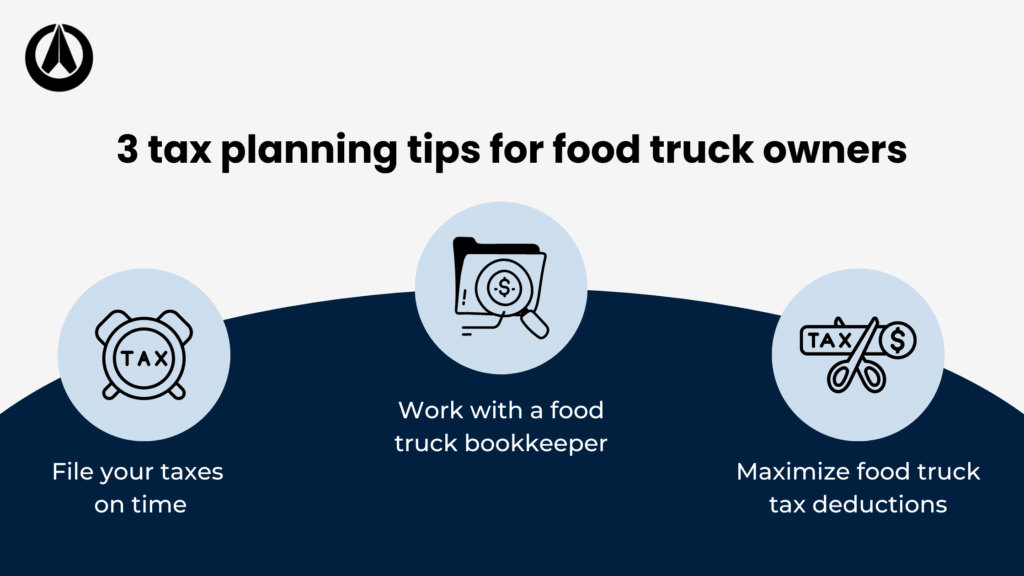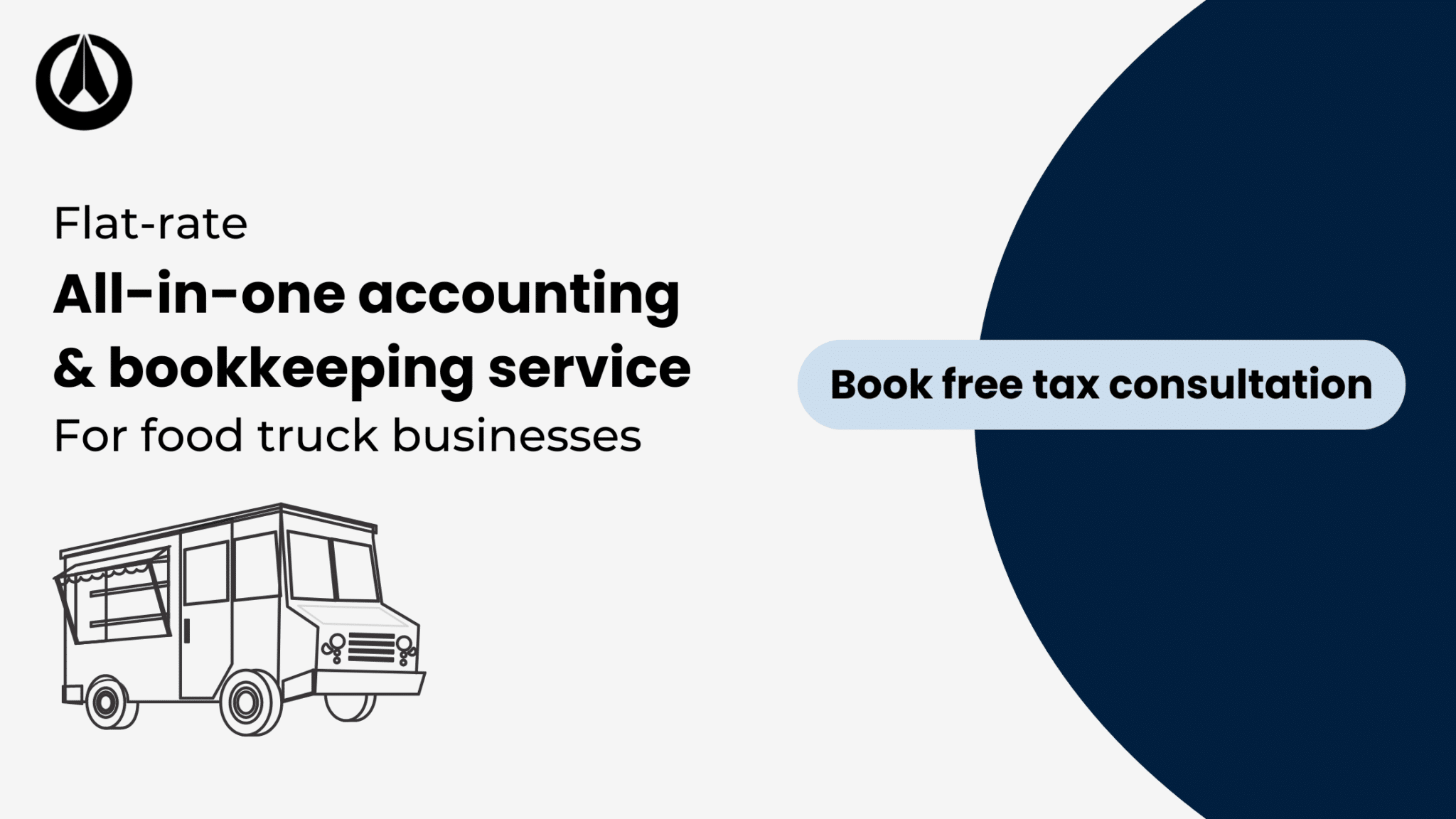Important Food Truck Taxes Guide Canada

Complying with food truck taxes in Canada doesn’t have to feel overwhelming. We’ve outlined what you should know about taxes while operating a food truck in Canada.
Table of Contents
Types of food truck taxes to be aware of
Running a food truck can be an exciting and profitable venture, but it comes with its share of tax responsibilities.
Navigating the various types of taxes applicable to your food truck business in Canada is essential to ensure compliance and maintain the financial health of your enterprise.
In this section, we’ll explore the key taxes you need to be aware of, including Income Tax, Goods and Services Tax (GST) / Harmonized Sales Tax (HST), Payroll Taxes, and Municipal Taxes.
Understanding these tax obligations will help you plan effectively and avoid any unpleasant surprises down the road.
Income Tax
Income tax is a fundamental aspect of running any business, including a food truck. As a food truck owner in Canada, you are required to report your business income and pay taxes on the profits you earn.
Here’s what you need to know about income tax in the context of your food truck operation:
Definition and applicable rates
Income tax is levied on the net income of your business after deducting allowable expenses from your total revenue.
In Canada, income tax rates vary depending on the structure of your business (sole proprietorship, partnership, or corporation) and your province or territory of operation.
For individuals (sole proprietors or partners), income tax is progressive; this means that tax rates increase as your income increases.
For corporations, a flat small business tax rate might apply if certain criteria are met.
How income is calculated for food truck businesses
Calculating your taxable income involves summing up all your revenue sources, including sales from food, beverages, and any other services provided by your food truck. From this total revenue, you can deduct your business expenses, such as the cost of ingredients, supplies, fuel, maintenance, and other operational costs.
The remaining amount, your net income, is what you’ll be taxed on. It’s crucial to maintain accurate records of all transactions and expenses to ensure compliance and to optimize your tax position.
Food truck tax filing requirements
Food truck owners must file an annual tax return with the Canada Revenue Agency (CRA). The specific forms and deadlines depend on your business structure.
Sole proprietors and partners generally report their business income on their personal income tax returns using Form T2125, Statement of Business or Professional Activities.
Corporations must file a T2 Corporate Income Tax Return. Keeping track of your filing deadlines and the necessary documentation is critical to avoid penalties and interest charges.
Tax installments
Depending on your expected tax liability, you may be required to make quarterly tax installment payments instead of paying a lump sum at the end of the year. This is particularly important for businesses with fluctuating income, common in the food truck industry.
Goods and Service (GST) / Harmonized Sales Tax (HST)
The Goods and Services Tax (GST) and Harmonized Sales Tax (HST) are crucial aspects of the Canadian tax system that food truck owners need to understand and comply with. These taxes apply to most goods and services sold in Canada, including those sold by food trucks.
Here’s a comprehensive look at GST/HST and how it impacts your food truck business:
Explanation of GST/HST
GST is a federal tax levied on the sale of goods and services across Canada. The standard GST rate is 5%. HST is a combination of the federal GST and provincial sales tax (PST) and applies in certain provinces where the two taxes are harmonized.
The HST rate varies depending on the province. For example, as of the current rates, Ontario has a 13% HST, while Nova Scotia has a 15% HST.
How GST/HST applies to food truck taxes
As a food truck owner, you are generally required to charge GST/HST on the food, beverages, and other items you sell, unless specific exemptions apply (e.g., certain basic groceries). You collect this tax from your customers and remit it to the Canada Revenue Agency (CRA).
Understanding the correct application of GST/HST is crucial to ensure compliance and avoid penalties.
Registration requirements for GST/HST
If your food truck business has annual taxable revenues of $30,000 or more, you are required to register for a GST/HST account with the CRA.
Even if your revenues are below this threshold, you may choose to register voluntarily. Registration allows you to claim input tax credits (ITCs) on the GST/HST paid on your business expenses, reducing your overall tax liability.
Collecting and remitting GST/HST
Once registered, you’ll need to charge the appropriate GST/HST rate on all taxable sales. You are also responsible for remitting the collected GST/HST to the CRA according to your reporting schedule, which could be monthly, quarterly, or annually, depending on your revenue and choice.
The remittance is done through filing a GST/HST return, which summarizes the tax collected from customers and the ITCs you are claiming.
Input Tax Credits (ITCs)
Input tax credits allow you to recover the GST/HST paid on eligible business expenses. These credits can significantly reduce the amount of tax you owe.
For example, if you paid GST/HST on ingredients, equipment, fuel, or other operating costs for your food truck, you can deduct these amounts from the total GST/HST you need to remit.
Proper documentation and record-keeping are essential for claiming ITCs.
Filing and compliance for food truck taxes in Canada
Timely filing of GST/HST returns is crucial. Late tax filings or payments can result in penalties and interest charges. Ensure that you are aware of your filing frequency and deadlines, and maintain accurate records of all sales and expenses to support your claims.
Municipal Taxes
Municipal taxes are local taxes imposed by the city or municipality where your food truck operates. These taxes and fees are essential to consider for ensuring that your food truck business complies with all local regulations.
Here’s a detailed look at municipal taxes and how they affect your food truck operations:
Business licenses and permits
Most municipalities require food truck owners to obtain specific licenses and permits to legally operate within their jurisdiction. These can include:
- Business License: A general license to conduct business within the city.
- Mobile Vending Permit: Specific to food trucks, this permit allows you to sell food on the streets or in designated zones within the municipality.
- Health Permits: Issued by the local health department to ensure that your food truck meets all health and safety standards.
The cost and process for obtaining these permits can vary widely between municipalities. It is crucial to contact your city hall or local municipal office to understand the requirements and associated fees.
Location-specific taxes and fees
Depending on where you operate, there may be additional location-specific taxes or fees, such as:
- Parking Fees: Some cities charge food trucks for parking in specific areas or designated food truck zones. These fees can be daily, monthly, or seasonal.
- Event Fees: If you plan to operate your food truck at local events, festivals, or markets, you might need to pay additional fees for event permits or vendor spaces.
Property tax considerations
If you own real estate that you use for your food truck business, such as a commissary kitchen or storage space, you may be subject to property taxes. These taxes are assessed annually by the municipality based on the value of the property.
Compliance and inspections
Compliance with municipal regulations often includes periodic inspections by health and safety officials. These inspections ensure that your food truck operates within local guidelines and maintains high standards of cleanliness and food safety. Failure to comply can result in fines, penalties, or even revocation of your permits.
Zoning and operating hours
Municipalities often have specific zoning laws that govern where food trucks can operate. These laws might restrict food trucks to certain areas or types of locations (e.g., commercial zones).
Additionally, there may be regulations regarding the operating hours for food trucks, which you must adhere to avoid fines and ensure smooth operations.
Staying updated on food truck taxes
Municipal regulations and tax requirements can change, so it’s essential to stay informed about any updates or changes in local laws that may affect your food truck business. Regularly checking with local authorities or subscribing to municipal bulletins can help you stay compliant.
Need help with understanding and filing food truck taxes in Canada?
At Sansar Solutions, we have experience working with food truck operators across Canada, providing businesses with all-in-one accounting and bookkeeping packages for just 1-flat rate.
Is food truck bookkeeping worth it?
Managing the finances of a food truck business can be particularly challenging due to the mobile nature and the variety of expenses involved, from fuel and ingredients to permits and maintenance.
Virtual food truck bookkeeping offers several advantages that can streamline this process, making it highly beneficial for food truck operators.
1. Cost-Effective and Accessible Expertise
Virtual bookkeeping allows food truck owners to access professional accounting services without the overhead costs associated with hiring an in-house bookkeeper. This is especially advantageous for small or seasonal businesses that may not require full-time financial staff.
By working with a virtual bookkeeper, you gain the flexibility to scale your bookkeeping needs according to your business’s fluctuations, ensuring you only pay for the services you need.
2. Real-Time Financial Tracking
One of the significant benefits of virtual bookkeeping is the ability to monitor your finances in real-time. Cloud-based accounting software enables you to track sales, expenses, and cash flow from anywhere, whether you’re at a bustling food truck festival or prepping for the day.
Immediate access to financial data helps you make informed decisions quickly, manage inventory effectively, and avoid cash shortages.
3. Enhanced Accuracy and Compliance
Virtual bookkeepers use advanced software that minimizes the risk of human error, resulting in more accurate financial records. Accurate bookkeeping ensures that you can claim all eligible deductions, properly apply GST/HST, and comply with filing requirements, reducing the risk of penalties or audits.
Additionally, professional bookkeepers stay current with tax laws and regulations, providing you with the peace of mind that your business remains compliant.
4. Time Savings and Focus on Core
Business By outsourcing bookkeeping tasks to a virtual professional, food truck owners can free up precious time to focus on cooking, customer service, and growing their business.
Rather than spending evenings sorting through receipts or balancing accounts, you can rely on your virtual bookkeeper to handle these tasks efficiently. This delegation allows you to concentrate on what you do best which is creating delicious food and building customer loyalty.
5. Scalability and Business Insights
As your food truck business grows, so do your financial management needs. Virtual bookkeeping services can easily scale with your operation, offering additional support as you expand your fleet or open new locations.
Moreover, virtual bookkeepers provide insightful financial reports and analyses, helping you understand your business’s financial health and identify opportunities for growth and improvement.
Types of records to keep for tracking food truck taxes
Operating expenses
Operating expenses for food trucks encompass the everyday costs associated with running your business. These include:
Food and Beverage Costs: Purchase of ingredients, beverages, and other food supplies necessary to prepare and serve your menu items.
Supplies and Utensils: Costs for disposable items such as napkins, cups, cutlery, and packaging materials, as well as reusable kitchen utensils and cleaning supplies.
Fuel and Maintenance: Expenses for fuel to operate your truck, as well as costs for regular maintenance and repairs to keep your vehicle in good working condition.
Permits and Licenses: Fees for obtaining and renewing business licenses, health permits, and mobile vending permits required to legally operate your food truck.
Employee Wages: Payroll expenses including wages, benefits, and any payroll taxes for employees who assist in food preparation and sales.
Marketing and Advertising: Costs associated with promoting your food truck, such as social media advertising, flyers, and participation in food truck festivals or events.
Utilities: If you operate from a commissary kitchen or have a business use of home, consider utility costs such as electricity, water, and internet.
Insurance: Premiums for business insurance policies, including liability and vehicle insurance, to protect your food truck operation.
Miscellaneous Expenses: Any other costs that arise in the daily operation of your food truck, such as parking fees, credit card processing fees, and office supplies.
Properly tracking these operating expenses is crucial for accurate financial reporting and maximizing tax deductions, ultimately contributing to the financial health and compliance of your food truck business.
Capital cost allowance (CCA)
Capital Cost Allowance (CCA) is a tax deduction available to Canadian businesses, including food trucks, for the depreciation of capital assets over time.
Unlike operating expenses, which are deducted in the year they are incurred, CCA allows you to write off the cost of significant assets gradually over several years.
Depreciable Assets: These include major purchases such as the food truck itself, kitchen equipment, refrigerators, generators, and any other substantial tools or machinery essential to the business.
Classes of Assets: Capital assets are divided into different classes, each with a specific rate at which you can claim depreciation. For instance, motor vehicles may fall into one class, while kitchen equipment might be categorized into another.
Calculation of CCA: You calculate CCA on the undepreciated capital cost (UCC) of your assets. Each year, you apply the prescribed rate to the UCC to determine your CCA claim. The result reduces the UCC, which affects the next year’s calculation.
Half-Year Rule: In the year you acquire an asset, you can generally only claim CCA on half of its cost. This is known as the half-year rule and it’s designed to reflect the fact that the asset wasn’t in use for the full year.
Impact on Taxes: Claiming CCA effectively reduces your taxable income by accounting for the wear and tear on your capital assets. However, it’s essential to balance your need for current deductions with future tax planning, as aggressive depreciation claims in early years will reduce available deductions in later years.
Record Keeping: Maintain detailed records of all capital purchases, including invoices and receipts. Keep an updated depreciation schedule to track the annual CCA claimed and the remaining UCC for each asset.
By understanding and utilizing CCA, food truck owners can optimize their tax strategy, manage cash flow effectively, and ensure the financial sustainability of their business over the long term.
Business use of home
For food truck owners who also use part of their home for business purposes, such as administrative tasks, inventory storage, or prep work, the “business use of home” deduction can provide valuable tax savings. This deduction allows you to claim a portion of your home’s expenses as business expenses, thereby reducing your taxable income.
Eligibility: To qualify for the business use of home deduction, a part of your home must be used exclusively and regularly for business activities, or it must be your primary place of business.
Deductible Expenses: You can claim a portion of expenses such as utilities (electricity, heating, water), home insurance, mortgage interest or rent, property taxes, and maintenance costs. The portion you can claim is typically based on the square footage or the percentage of your home used for business purposes.
Calculation: Determine the percentage of your home used for business by dividing the area used for business by the total area of your home. Apply this percentage to each of the eligible expenses to calculate the amount you can deduct.
Record Keeping: Maintain detailed records of all household expenses and clearly document how you calculate the business portion. Keep invoices, receipts, and utility bills to support your claims.
Limitations: It’s important to note that the deduction for business use of home expenses cannot exceed your net income from the business activity. If your business incurs a loss after accounting for these expenses, the deduction may be limited or carried forward to future years.
CRA Guidelines: The Canada Revenue Agency (CRA) provides specific guidelines and forms for claiming business use of home expenses. For sole proprietors and partners, use Form T2125, Statement of Business or Professional Activities, and for corporations, similar deductions can be claimed within the corporate tax return.
By accurately claiming the business use of home deduction, food truck owners can effectively lower their taxable income, thereby optimizing their overall tax strategy while managing a portion of their home-related expenses.
Available tax credits for food trucks
Food truck businesses in Canada can benefit from several tax credits designed to support small enterprises and promote specific activities:
Small Business Deduction: A significant tax credit for incorporated food truck businesses, reducing the federal tax rate on the first $500,000 of active business income.
Input Tax Credits (ITCs): These allow businesses registered for GST/HST to claim credits for the tax paid on eligible expenses, effectively reducing the amount of GST/HST they owe.
Provincial Tax Credits: Various provinces offer specific credits, such as incentives for hiring apprentices or credits for investing in eco-friendly equipment and practices.
Scientific Research and Experimental Development (SR&ED) Tax Credit: Available if your food truck business engages in eligible research and development activities, such as developing new recipes or innovative cooking techniques.
By understanding and leveraging these tax credits, food truck owners can significantly reduce their tax burden and reinvest savings back into their business.
Tax planning tips for food truck owners
Navigating the tax landscape is a crucial aspect of running a successful food truck business. Proper tax planning not only ensures compliance with regulations but also helps optimize your financial health, allowing you to invest more in your culinary ventures.
Here are some essential tax planning tips that every food truck owner should consider to streamline their operations and enhance profitability.
Specifically, we’ll focus on the importance of filing your taxes on time, working with a specialized food truck bookkeeper, and maximizing your tax deductions.
Implementing these strategies can alleviate the stress of tax season and contribute to the long-term success of your food truck business.

File your taxes on time
Ensuring that you file your taxes on time is a fundamental practice for maintaining your food truck business’s financial health and compliance.
Timely filing not only helps you avoid costly penalties and interest charges but also ensures that you stay in good standing with the Canada Revenue Agency (CRA).
By meeting all filing deadlines, you can prevent disruptions to your cash flow and avoid the stress of last-minute preparations.
Filing deadlines vary based on your business structure:
- Sole Proprietors and Partnerships: Personal income taxes, which include business income, are generally due by April 30th each year. However, if you or your spouse/common-law partner is self-employed, the filing deadline extends to June 15th, with any balance owing still due by April 30th.
- Corporations: Corporate income tax returns are due six months after the end of the fiscal year, with any taxes owing typically due within two months of the year-end.
Adhering to these deadlines is crucial. Missing a tax filing deadline can lead to significant penalties and interest charges, which can compound over time and create a financial burden for your business.
For more detailed information on the consequences of late filings and how to address them, see our guide on late business tax filing.
By prioritizing timely tax filings, food truck owners can focus on their core business operations, build customer loyalty, and sustain their entrepreneurial success.
Work with a food truck bookkeeper
Collaborating with a specialized food truck bookkeeper can provide invaluable support for managing your business’s finances.
A bookkeeper with experience in the food truck industry understands the unique challenges and expenses associated with running a mobile eatery, from fluctuating daily sales to variable operating costs.
By leveraging their expertise, you can ensure accurate record-keeping, efficient tax preparation, and compliance with all relevant regulations.
A professional bookkeeper helps by:
- Tracking Sales and Expenses: Keeping detailed records of all transactions, enabling you to monitor your cash flow and profitability.
- Managing Payroll: Ensuring that employee wages and related deductions are correctly processed and reported.
- Preparing Financial Statements: Generating essential financial reports to help you understand your business’s health and make informed decisions.
Furthermore, a dedicated bookkeeper can provide strategic tax planning advice, identifying potential deductions and credits specific to your food truck operation. This can lead to significant tax savings and improved financial management.
For a deeper dive into the benefits and considerations of working with a bookkeeper for your food truck, visit our service page on food truck bookkeeping.
Partnering with a knowledgeable bookkeeper allows you to focus on delivering great food and excellent service while maintaining confidence in your financial stewardship.
Maximize food truck tax deductions
Maximizing your food truck tax deductions is a crucial strategy for reducing your taxable income and improving your business’s bottom line.
By carefully tracking and claiming eligible deductions like operational expenses, vehicle costs, and business use of home, you can significantly lower your tax liability.
Additionally, taking advantage of capital cost allowance (CCA) to depreciate major assets and leveraging available tax credits can provide further financial benefits.
Ensuring meticulous record-keeping and staying informed about all applicable tax breaks allows you to optimize your tax strategy, ultimately leaving more resources to reinvest in and grow your food truck business.
Common mistakes owners make with food truck taxes
Navigating the complexities of tax compliance is a crucial aspect of operating a successful food truck business. However, it’s not uncommon for food truck owners to encounter pitfalls that can lead to significant financial and legal repercussions.
In this section, we’ll explore some of the most common mistakes that food truck owners make when it comes to their taxes, such as misclassifying employees as contractors, improperly charging GST/HST, and neglecting to file or pay taxes on time.
By understanding and avoiding these errors, you can ensure smoother operations and greater financial security for your business.
Misclassifying employees as contractors
Misclassifying employees as independent contractors is a common mistake that can result in serious financial and legal consequences for food truck owners. Proper classification is crucial because it affects how you handle payroll taxes, benefits, and compliance with labor laws.
Employee vs. Contractor: The distinction between an employee and an independent contractor hinges on the level of control and independence in the working relationship. Employees typically have set working hours, receive direct supervision, and use equipment provided by the employer. In contrast, independent contractors operate their own business, have control over how and when they do their work, and may provide services to multiple clients.
Implications of Misclassification: Misclassifying an employee as a contractor can lead to significant penalties, including back taxes, interest, and fines. You may also be required to pay missed benefits such as CPP, EI, and vacation pay. Additionally, non-compliance with employment standards can result in legal disputes and reputational damage.
CRA Guidelines: The Canada Revenue Agency (CRA) provides specific guidelines to help determine the correct classification. Factors to consider include the degree of control, ownership of tools, financial risk, and the opportunity for profit.
Best Practices: To avoid misclassification, carefully assess the working relationship using the CRA’s criteria. When in doubt, consult the CRA’s resources or seek professional advice. Clear contracts that outline the nature of the relationship and mutual expectations can also help establish proper classification.
By accurately classifying workers, food truck owners ensure compliance with tax and labor regulations, safeguarding their business from potential liabilities and fostering a fair working environment.
Not charging GST/HST properly
Improperly charging Goods and Services Tax (GST) or Harmonized Sales Tax (HST) is a frequent mistake that can have significant financial and legal repercussions for food truck owners. Ensuring that you charge the correct amount of GST/HST on your sales is critical for compliance with Canadian tax laws.
Understanding GST/HST: GST is a federal tax, whereas HST is a combination of GST and provincial sales tax, which applies in provinces where the taxes are harmonized. The rates vary across provinces, so it’s essential to know the specific rate applicable to the location where your food truck operates.
Registration Requirements: If your food truck business has annual taxable revenues of $30,000 or more, you are required to register for a GST/HST account with the Canada Revenue Agency (CRA). Even if your revenues are below this threshold, voluntary registration can be beneficial as it allows you to claim input tax credits on eligible business expenses.
Proper Charging: To charge GST/HST correctly:
- Know Your Rates: Be aware of the GST/HST rate for the province in which you are operating. For example, Ontario has a 13% HST, while Alberta only requires the 5% GST.
Apply Correctly: Ensure the tax is added to the selling price of taxable items. Use accounting or point of sale (POS) software to automate and accurately apply these calculations. - Documentation: Keep detailed receipts and invoices that show the amount of GST/HST collected on each sale.
- Errors and Compliance: Failing to charge the correct GST/HST can lead to substantial penalties, interest charges, and audits from the CRA. Overcharging or undercharging customers not only affects your credibility but can also disrupt your financial records and cash flow.
- Best Practices: Regularly review and update your knowledge of applicable tax rates. Use software systems to manage your sales and tax calculations accurately. Seek professional advice if you encounter complex taxation issues or changes in tax regulations.
By charging GST/HST properly, food truck owners can maintain compliance with tax laws, avoid costly penalties, and ensure the transparent operation of their business.
Neglecting to file or pay taxes on time
Neglecting to file or pay taxes on time is a critical mistake that can have serious financial and legal consequences for food truck owners. Timely tax compliance is essential for maintaining good standing with the Canada Revenue Agency (CRA) and preventing disruptions to your business operations.
Penalties and Interest: The CRA imposes significant penalties and interest charges on late filings and overdue tax payments. For instance, if you fail to file your return on time, you may be subject to a penalty of 5% of the balance owing, plus 1% for each full month your return is late, up to a maximum of 12 months. Interest on unpaid taxes compounds daily, further increasing the amount owed over time.
Cash Flow Disruptions: Accumulated penalties and interest can strain your cash flow, diverting funds away from crucial business activities like purchasing supplies, paying employees, and maintaining your food truck. This financial strain can impede your ability to operate effectively and grow your business.
Legal Repercussions: Continuous failure to comply with tax obligations can lead to more severe legal actions, such as garnishment of bank accounts, seizure of assets, and legal proceedings. These actions can severely damage your business’s reputation and financial stability.
Loss of Tax Credits and Deductions: Neglecting timely filings and payments can also result in the forfeiture of eligible tax credits and deductions. These missed opportunities can increase your overall tax burden, as you lose out on potential savings designed to support small businesses.
Best Practices for Compliance: To avoid these pitfalls, set reminders for key tax deadlines, such as filing dates for income tax returns, GST/HST returns, and payroll remittances. Utilize accounting software to automate and track your tax obligations. Regularly review your financial records and consult with a tax professional to ensure accurate and timely filings.
By prioritizing the timely filing and payment of taxes, food truck owners can avoid costly penalties and interest, maintain healthy cash flow, and ensure the ongoing success and compliance of their business.
Should you hire a professional to help with identifying savings for food truck taxes?
Hiring a professional to assist with identifying tax savings for your food truck business can be highly beneficial. Tax professionals such as CPAs (Certified Professional Accountants) and bookkeepers who specialize in small businesses understand the complexities and nuances of the tax code.
They can help you navigate various deductions, credits, and tax strategies that you might not be aware of, potentially saving you a significant amount of money.
Expert Knowledge: Professionals stay updated on the latest tax laws and regulations. They can identify all eligible deductions and credits specific to food truck operations, such as those related to operational expenses, capital cost allowances, and business use of home.
Accurate Record-Keeping: A professional can help set up and maintain detailed financial records, ensuring that all expenses and revenues are accurately tracked. This precise record-keeping is crucial for substantiating your tax claims and maximizing deductions.
Strategic Planning: Tax professionals can offer valuable strategic advice, such as the best ways to structure your purchases, when to claim certain expenses, and how to manage cash flow to minimize tax liability. This long-term planning can result in significant savings.
Time and Stress Savings: Managing your own taxes can be time-consuming and stressful. By outsourcing this task to a professional, you can focus on running your food truck and serving your customers, knowing that your taxes are in expert hands.
Compliance and Audit Support: Professionals can ensure that you are fully compliant with all tax obligations, reducing the risk of penalties and audits. In the event of an audit, they can provide representation and support, making the process less daunting.
Hiring a professional to help with identifying tax savings for your food truck business is a wise investment. Their expertise can lead to considerable financial benefits and peace of mind, allowing you to concentrate on growing your culinary venture.
Rely on Sansar Solutions for affordable food truck taxes and bookkeeping services
Navigating the financial landscape of a food truck business can be complex and time-consuming, but with Sansar Solutions, you can simplify the process and ensure compliance with all tax regulations.
Specializing in affordable bookkeeping and tax services tailored for food truck operators, Sansar Solutions offers expert guidance on tracking expenses, maximizing deductions, and properly managing GST/HST obligations.
By leveraging our extensive knowledge and industry-specific experience, you can focus on serving delicious food to your customers while we handle the intricacies of your financial management.
Trust Sansar Solutions to provide accurate, reliable, and cost-effective support, helping your food truck business thrive and grow without the stress of financial mismanagement.
Questions we get about food truck taxes in Canada
Yes, food trucks typically pay local taxes, which can include business licenses, permits, and other municipal fees specific to the area where they operate. These may cover costs such as mobile vending permits, health permits, and parking fees. Each municipality has its own set of requirements and rates, so it’s important for food truck owners to check with local authorities to ensure compliance with all applicable local taxes and regulations.
Local truck drivers in Canada can claim various tax deductions to reduce their taxable income, including:
Vehicle Expenses: Costs for fuel, maintenance, repairs, insurance, and depreciation (CCA) of the truck.
Meals and Lodging: If applicable, meal allowances and lodging expenses incurred during overnight trips, subject to CRA limits and conditions.
License and Registration: Fees for obtaining and renewing licenses and vehicle registration.
Work-Related Supplies: Purchase of work-related tools, uniforms, and safety equipment.
Cell Phone and Communication: A portion of phone expenses used for work purposes.
Proper documentation and receipts must be kept to substantiate these claims.
Even if your food truck operates seasonally, you still need to report all income and expenses for the periods you are operational. Tax liability is based on the total annual revenue and expenses, including any part-time or seasonal operations.
Yes, if you are registered for GST/HST, you can claim input tax credits (ITCs) for the GST/HST paid on eligible business expenses, thereby reducing the amount of tax you owe.
Hiring a professional, such as a business accountant or specialized bookkeeper, can be highly beneficial. They can help you navigate complex tax laws, identify eligible deductions and credits, maintain accurate records, and ensure compliance with all tax obligations.
You can deduct various operating expenses, including food ingredients, supplies, fuel, maintenance, permits, insurance, marketing, and employee wages. Capital assets like your food truck and equipment can be depreciated using Capital Cost Allowance (CCA).
Yes, if your food truck business has annual taxable revenues of $30,000 or more, you must register for a GST/HST account and charge GST/HST on your sales. The rate depends on the province where you operate.
Share
Subscribe For Business Tax Tips & Insights
Get the update on business news, tax deadlines, and new insights to stay on top of your taxes.
Read more articles by Sansar Solutions

Business Tax Consultant: When To Hire
Not sure if you need a business tax consultant? This quick guide breaks down when and why to bring one on board—before it costs you.

Corporation Bookkeeping Guide Canada
If you run a corporation in Canada, understanding your bookkeeping duties isn’t optional—it’s essential for staying compliant and maximizing growth.

Best Online Bookkeeping Services for Small Business
Discover the best online bookkeeping services to keep your finances organized, accurate, and tax-ready—without the hassle.

Failure to File Corporate Tax Return: What Happens Next?
Dealing with failure to file a corporate tax return is something that should be resolved before things get worse. Missing tax deadlines isn’t just about penalties—it threatens your business’s very survival.

Impact of Filing Corporate Taxes Late with CRA
Don’t panic about filing corporate taxes late! This comprehensive guide walks you through what happens next, how to minimize penalties, and practical steps to resolve your situation with the CRA.

Xero Online Bookkeeping: Is It Worth It?
Is Xero online bookkeeping worth it? Discover the pros, features, and benefits to see if Xero is the right choice for your business.


